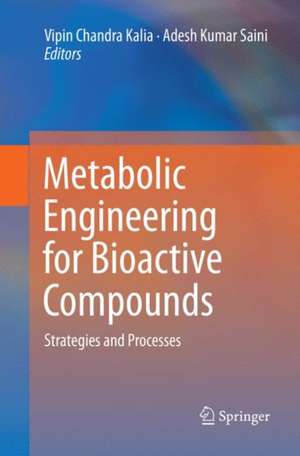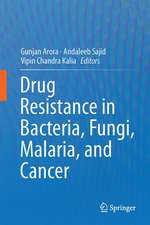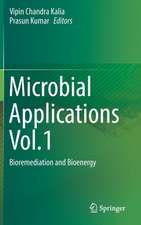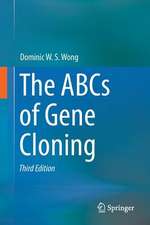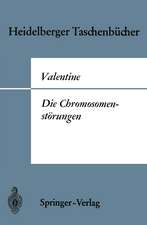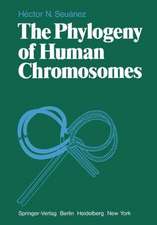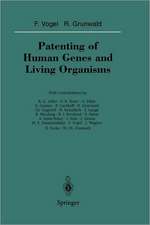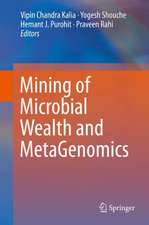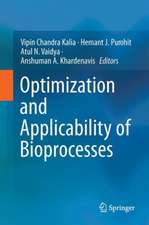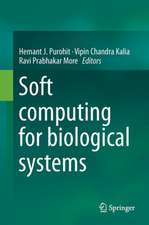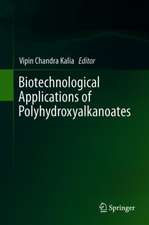Metabolic Engineering for Bioactive Compounds: Strategies and Processes
Editat de Vipin Chandra Kalia, Adesh Kumar Sainien Limba Engleză Paperback – 12 dec 2018
| Toate formatele și edițiile | Preț | Express |
|---|---|---|
| Paperback (1) | 794.21 lei 39-44 zile | |
| Springer Nature Singapore – 12 dec 2018 | 794.21 lei 39-44 zile | |
| Hardback (1) | 959.04 lei 3-5 săpt. | |
| Springer Nature Singapore – 24 oct 2017 | 959.04 lei 3-5 săpt. |
Preț: 794.21 lei
Preț vechi: 1045.01 lei
-24% Nou
Puncte Express: 1191
Preț estimativ în valută:
151.98€ • 162.51$ • 126.71£
151.98€ • 162.51$ • 126.71£
Carte tipărită la comandă
Livrare economică 14-19 aprilie
Preluare comenzi: 021 569.72.76
Specificații
ISBN-13: 9789811354144
ISBN-10: 9811354146
Pagini: 412
Ilustrații: XVI, 412 p. 54 illus., 31 illus. in color.
Dimensiuni: 155 x 235 mm
Ediția:Softcover reprint of the original 1st ed. 2017
Editura: Springer Nature Singapore
Colecția Springer
Locul publicării:Singapore, Singapore
ISBN-10: 9811354146
Pagini: 412
Ilustrații: XVI, 412 p. 54 illus., 31 illus. in color.
Dimensiuni: 155 x 235 mm
Ediția:Softcover reprint of the original 1st ed. 2017
Editura: Springer Nature Singapore
Colecția Springer
Locul publicării:Singapore, Singapore
Cuprins
1. Developments and diversity of proteins and enzymes.- 2. Strategies for Gene Expression in Prokaryotic and Eukaryotic System.- 3. Molecular farming approach towards bioactive compound.- 4. Protein therapeutics: Production, application and future scenario.- 5. Engineering in plant genome using Agrobacterium: progress and future.- 6. Engineering Saccharomyces cerevisiae for C5 fermentation: A step towards second generation biofuel production.- 7. Gaining insight into plant responses to beneficial and pathogenic microorganisms using metabolomic and transcriptomic approaches.- 8. Engineering Yeast as cellular factory.- 9. Yeast as a model system to study human diseases.- 10. Cellulases: Industrial workhorse in bioenergy sector.- 11. Green chemistry approach towards nanoparticles synthesis.- 12. The antiproliferative and anti-bacterial effect of Moringa oleifera mediated gold nanoparticles: A review.- 13. Nanoparticles in diverse biological Application.- 14. Nanomaterials enabled immunotherapeutic applications.- 15. Biosynthesis of Nanoparticles and their application in Pharmaceutical industry.
Notă biografică
Dr. Vipin Chandra Kalia is an Emeritus Scientist of the CSIR Institute of Genomics and Integrative Biology, Delhi. He holds an M.Sc. and Ph.D. in Genetics, both from the Indian Agricultural Research Institute, New Delhi. Further, he is a Fellow of the National Academy of Sciences, National Academy of Agricultural Sciences, and Association of Microbiologists of India.
His main areas of research are microbial biodiversity, bioenergy, biopolymers, quorum sensing and quenching, and drug discovery. He has published more than 100 papers in scientific journals including Nature Biotechnology, Biotechnology Advances, and Bioresource Technology.
He has authored 14 book chapters. He has edited seven books and is currently the Editor-in-Chief of the Indian Journal of Microbiology (since 2013) and Editor of several journals, including the Journal of Microbiology & Biotechnology (Korea) and Dataset Papers in Microbiology. He is a member of numerous professional associations, including the Society of Biological Chemists of India and the Biotech Research Society of India (BRSI). He can be contacted at: vckalia@igib.res.in; vc_kalia@yahoo.co.in
Dr. Adesh Kumar Saini is a Professor and Director of the Center of Research for Himalayan Sustainability and Development, Shoolini University, India. He received his Ph.D. in Microbiology from the CSIR Institute of Genomics and Integrative Biology and completed his post-doctoral research at the National Institutes of Health. His main areas of research are microbial biodiversity, sustainable development of the Himalayan ecosystem, and yeast cell biology. He has published more than 25 papers in prominent scientific journals, including the EMBO Journal and Journal of Biological Chemistry. His research projects aim at plant-growth-promoting rhizobacteria (PGPR), and post-fire management in the pine forests and revival of forest productivity. He can be contacted at: sainiade@gmail.com; adeshsaini@shooliniuniversity.com
His main areas of research are microbial biodiversity, bioenergy, biopolymers, quorum sensing and quenching, and drug discovery. He has published more than 100 papers in scientific journals including Nature Biotechnology, Biotechnology Advances, and Bioresource Technology.
He has authored 14 book chapters. He has edited seven books and is currently the Editor-in-Chief of the Indian Journal of Microbiology (since 2013) and Editor of several journals, including the Journal of Microbiology & Biotechnology (Korea) and Dataset Papers in Microbiology. He is a member of numerous professional associations, including the Society of Biological Chemists of India and the Biotech Research Society of India (BRSI). He can be contacted at: vckalia@igib.res.in; vc_kalia@yahoo.co.in
Dr. Adesh Kumar Saini is a Professor and Director of the Center of Research for Himalayan Sustainability and Development, Shoolini University, India. He received his Ph.D. in Microbiology from the CSIR Institute of Genomics and Integrative Biology and completed his post-doctoral research at the National Institutes of Health. His main areas of research are microbial biodiversity, sustainable development of the Himalayan ecosystem, and yeast cell biology. He has published more than 25 papers in prominent scientific journals, including the EMBO Journal and Journal of Biological Chemistry. His research projects aim at plant-growth-promoting rhizobacteria (PGPR), and post-fire management in the pine forests and revival of forest productivity. He can be contacted at: sainiade@gmail.com; adeshsaini@shooliniuniversity.com
Textul de pe ultima copertă
This book comprehensively discusses the latest research in the area of metabolic engineering. Metabolic engineering solutions for bioactive compounds are now being derived by means of heterologous gene expression, in a wide range of organisms. The book provides an overview of the model systems being employed for metabolic manipulation to yield bioactive molecules, such as single-cell proteins, antibody generation, metabolites, proteases, chaperones, therapeutic proteins, nanomaterials, polymeric conjugates, dendrimers and nanoassemblies, Escherichia coli, Agrobacterium, Saccharomyces cerevisiae and cell lines, etc. In addition, it shares insights into the scope of these methods in the areas of prevention, diagnosis and treatment of diseases, e.g. immunotherapy for curing various diseases like cancer, allergies, autoimmune diseases, etc.
Caracteristici
Discusses practical solutions for a number of diseases through novel nanotechnological approaches Provides insights into basics and applications of metabolomics and transcriptomics Discusses complex methodologies lucidly through figures and flowcharts
